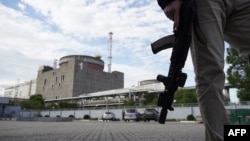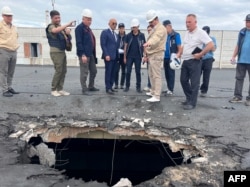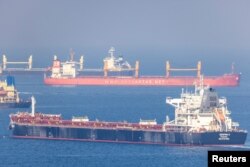The International Atomic Energy Agency says the Zaporizhzhia nuclear power plant in southern Ukraine lost all access to external electricity following overnight shelling and is currently receiving backup power from its emergency diesel generators.
Nuclear operator Energoatom blamed Russia for shelling in the area that damaged power lines and electrical substations. Russia put the blame on Ukraine.
The IAEA said in a statement that senior Ukrainian operating staff informed their experts of indications that the power lines were physically damaged "at two different locations about 50-60 kilometers from the plant itself, in Ukrainian-controlled territory." Repair work was under way at one of the locations.
IAEA Director General Rafael Grossi said in a statement that the development is "extremely concerning" and "again demonstrates the plant's fragile and vulnerable situation." He has been working with both sides to establish a demilitarized protection zone around the nuclear plant.
"Measures are needed to prevent a nuclear accident at the site. The establishment of a nuclear safety and security protection zone is urgently needed," he said.
Separately, the IAEA said its inspectors investigating Russian claims that Ukraine is preparing to use a "dirty bomb" have not found any indications of undeclared nuclear activities and materials at the three sites they have inspected.
Ukraine has strongly denied Moscow's allegations that it is planning to detonate a dirty bomb on its own territory and in turn accused Russia of plotting to use the threat of a bomb laced with nuclear material as a pretext for an escalation in Ukraine.
Russia raised the matter at the U.N. Security Council last week and warned in a letter that it "will regard the use of the dirty bomb by the Kyiv regime as an act of nuclear terrorism."
Ukraine invited the IAEA inspectors. The IAEA said they visited the locations where Russia made allegations about activities: the Institute for Nuclear Research in Kyiv, Eastern Mining and Processing Plant in Zhovti Kody, and Production Association Pivdennyi Machine-Building Plant in Dnipro.
The agency said its inspectors were given "unfettered access to the locations."
"Our technical and scientific evaluation of the results we have so far did not show any sign of undeclared nuclear activities and materials at these three locations," IAEA chief Grossi said.
He said the inspectors also collected environmental samples as part of their work and the agency would report on the results of those tests as soon as possible.
Meanwhile, Russia failed to gain traction in the U.N. Security Council on Wednesday for its proposal to send a formal commission to investigate its allegation that the United States and Ukraine have a secret biological weapons programs in Ukraine. A resolution it put forward calling for the commission was supported only by China.
U.N. disarmament officials have long said they are not aware of any biological weapons programs in Ukraine, while Kyiv and Washington deny the accusation.
Grain deal
In Istanbul, the U.N.-run Joint Coordination Center (JCC) that oversees implementation of the deal to get Ukrainian grain exports out through the Black Sea said Thursday that the Russian delegation had resumed its work at the JCC and joined vessel inspections.
Moscow suspended its participation in the deal on Saturday, after alleging Ukraine used drones to attack the Russian Black Sea fleet. It reversed that decision on Wednesday.
"Now that the initiative has fully resumed, I appeal to all parties to concentrate efforts in two areas," U.N. Secretary-General Antonio Guterres said Thursday.
"First, to [the] renewal and full implementation of the Black Sea Grain Initiative. Second, to removing the remaining obstacles to the exports of Russian food and fertilizer."
Russia has repeatedly said it is not getting the benefit it seeks from the deal, as some private companies are afraid of running afoul of international sanctions. Speaking at a news conference in Jordan, Russian Foreign Minister Sergey Lavrov said Thursday his country had called on the United Nations to help fulfill the part of deal that would ease Russia's food exports.
While there are no U.S. or European sanctions on Russian food or fertilizer exports, U.N. officials say overcompliance has been an issue.
"The world needs concerted efforts to urgently address the global fertilizer market crunch and make full use of Russian export capacity essential for that purpose," the U.N. chief said. "High fertilizer prices are already affecting farmers around the world; we cannot allow the global fertilizer shortage to morph into a global food shortage."
Ukrainian food exports through the initiative reached a milestone Thursday. Guterres told reporters that 10 million metric tons have been exported in just three months.
"Despite all the obstacles we have seen, the beacon of hope in the Black Sea is still shining and the initiative is working," Guterres said. "It is our collective responsibility to keep it working smoothly."
The deal's initial 120 days runs out this month. It will be automatically renewed if no party objects.
Since it was signed in July, the Black Sea Grain Initiative has helped ease the global food crisis, bringing down the price of wheat and other commodities on international markets.
Iran, North Korea weapons
The Pentagon on Tuesday raised "concerns" that Russia may try to acquire more weapons from Iran and North Korea to use in its war against Ukraine.
Russia recently has targeted civilian infrastructure with Iranian-made drones, and Iranian personnel are helping the Russian military launch these drone attacks from the Crimean Peninsula, according to the United States.
Iran has repeatedly denied it is providing Russia drones and military support.
VOA Pentagon correspondent Carla Babb contributed to this story. Some information came from The Associated Press, Agence France-Presse and Reuters.







